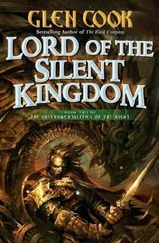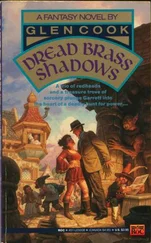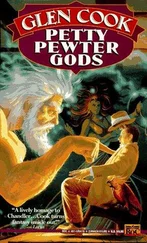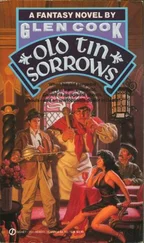Glen Cook - Doomstalker
Здесь есть возможность читать онлайн «Glen Cook - Doomstalker» весь текст электронной книги совершенно бесплатно (целиком полную версию без сокращений). В некоторых случаях можно слушать аудио, скачать через торрент в формате fb2 и присутствует краткое содержание. Жанр: Фантастика и фэнтези, на английском языке. Описание произведения, (предисловие) а так же отзывы посетителей доступны на портале библиотеки ЛибКат.
- Название:Doomstalker
- Автор:
- Жанр:
- Год:неизвестен
- ISBN:нет данных
- Рейтинг книги:4 / 5. Голосов: 1
-
Избранное:Добавить в избранное
- Отзывы:
-
Ваша оценка:
- 80
- 1
- 2
- 3
- 4
- 5
Doomstalker: краткое содержание, описание и аннотация
Предлагаем к чтению аннотацию, описание, краткое содержание или предисловие (зависит от того, что написал сам автор книги «Doomstalker»). Если вы не нашли необходимую информацию о книге — напишите в комментариях, мы постараемся отыскать её.
Doomstalker — читать онлайн бесплатно полную книгу (весь текст) целиком
Ниже представлен текст книги, разбитый по страницам. Система сохранения места последней прочитанной страницы, позволяет с удобством читать онлайн бесплатно книгу «Doomstalker», без необходимости каждый раз заново искать на чём Вы остановились. Поставьте закладку, и сможете в любой момент перейти на страницу, на которой закончили чтение.
Интервал:
Закладка:
Gorry continued to stare vacantly for several seconds. Then she shuddered all over, like a wet meth getting the water out of her fur. She said, "You did very well, Marika. My confidence in you has been justified. That is enough for today. You are excused from all classes and chores. You need to rest." All spoken in a feeble voice quivering with uncertainty.
"Thank you, mistress." She was careful not to betray the fact that she felt no weariness as she departed, pushing past servants hurrying to remove the kagbeast to the kitchens. Several eyed her warily, which she noted without paying attention. There were servants everywhere these days, and one paid them no mind at all. The influx of refugees meant work had to be created.
She went directly to her cell, lay on her pallet contemplating the afternoon's events, unaware that she had adopted a silth mind-set. Every nuance of what had-and had not-transpired had to be examined for levels of meaning.
Somehow, she was sure, she had gone through a rite of passage. A rite not planned by Gorry. But she was not sure what it was.
She willed her body to relax, muscle by muscle, as she had been taught, and pushed herself into a light sleep. A wary sleep, like that of a huntress in the field, overnighting in the forest far from her home packstead.
A part of her remained huntress. That would never change.
Never would she relax her guard.
III
Another year of exile passed. It was no happier than its predecessor.
Marika went to that part of the wall which overlooked the dam and powerhouse. There was a place there that she thought of as her own. A place only the newest refugees failed to respect as private and hers alone. A place surrounded by an invisible barrier that not even Gorry or her cronies among the old silth would cross when Marika was present. Marika went there when she wanted to be entirely free of care.
Each silth had such a place. For most it was their quarters. But the identity of such places developed in a tacit, unconscious fashion, within the shared awareness of the silth community. The silth of Akard gradually became aware that this place on the wall was the one where the wild pup was sovereign.
She liked the wind and the cold and the view. More, she liked the fact that she could not be physically approached without time to arrange her thoughts. There were those few who would and did dare intrude-the senior and Khles Gibany, for example-though they would do so only with sound cause.
The Husgen was frozen. Again. The silth had scores of refugee workers out keeping the ice from choking the pipes to the powerhouse. It was a winter worse than the previous two, and each of those had set new records for inflicting misery. There were fewer storms this year, and less snow, but the wind was as fierce as ever, and its claws of cold were sharper than ever. The ice wind found its way even into the heart of the fortress, mocking the roaring fires burning in every fireplace. The edge of the forest, a third mile beyond the bounds of the tilled ground, had retreated two hundred yards last summer. Deadwood had been gathered from miles around. Firewood clogged every cranny of the fortress. And still Braydic shivered when she ran calculations of consumption against time left to withstand.
Foraging parties were not going out this winter. No one was allowed beyond reach of the massed power of the Akard silth. It was rumored that none of the Zhotak nomads had stayed behind this winter.
That first bleak winter only a relative few had come south. Though the Degnan had been consumed, most of the upper Ponath packs had survived. The few nomads who had not fled north had been destroyed by the silth. The second winter had seen fully half the upper Ponath packs destroyed, and the summer following had been a time of constant blood as the silth strove to overcome those masses of nomads trying to hang on in the captured packsteads. Many nomads had perished, but the silth had failed to force a complete withdrawal.
The nomads had no wehrlen to lead them now, but they no longer needed one. They had become melded into one vast superpack. This year the northern horde had come early, during the harvest season. The silth did all they could, but the savages were not intimidated by slaughter or silth witchcraft. Always there were more desperate packs to replace those consumed by the Reugge fury.
Most of the surviving packsteads had been destroyed or overcome and occupied. Braydic predicted that none of the nomads would retreat come spring.
Marika sensed that this third winter of her exile marked the end of the upper Ponath as the frontier of civilization. This year the more mobile of the forerunner nomads were ranging far south of Akard. They gave the fortress a wide berth, then followed the course of the Hainlin, which had become a twisting road of ice carrying their threat down to the lands of the south. Only one other fastness of civilization remained unscathed, the tradermale packfast downriver, Critza.
Marika had seen Critza but once, briefly, from afar, during the nomad hunts of the previous summer. It was a great stone pile as forbidding as Akard itself. A great many refugees had fled there, too. More than to Akard, for the tradermales were not feared the way silth were.
They were not feared by the nomads either. The savages had attacked Critza once the second winter and twice already this year-without success. The tradermales were said to possess many strange and terrible weapons. The nomads had left many hundreds of dead outside Critza's walls.
Marika had been only vaguely aware of Critza's existence till she had seen it. Then she had been amazed that the silth would permit so much independent strength to exist within their demesne. Especially in the hands of males. For the silth had very strong convictions about males. Convictions which beggared the prejudices of the meth of the upper Ponath.
They would not permit an unneutered male inside Akard. That imposed a terrible burden upon those pawfuls of survivors who fled to the fortress, especially those packs with hopes of someday breeding back up.
There was a small village of unneutered males almost below the point where Marika stood, scratching for life in shelters pitched against the wall and appealing to the All for help that would not come from those who protected them. Even a few stiff-necked huntresses stayed out there rather than bow to silth demands.
Marika suspected most of those meth would move on to Critza when travel became less hazardous.
But Critza-why did such a place exist here? Not one of the old silth had a kind word for the tradermales, nor trusted them in the least. They were the next thing to rogue, a definite threat to their absolute power, if only because they carried news between the packsteads.
Braydic said tradermales were necessary to the balance. They had a recognized niche in the broader law of the south, which was accepted by all the sisterhoods. The silth did not like the tradermale brotherhood, but had to accept it-as long as the tradermales remained within certain carefully defined professional strictures.
Marika shuddered but ignored the savage wind as she surveyed the view commanded by the packfast. Never in the entire history of the packfast-which reached back centuries before the coming of the Degnan to the upper Ponath-had there been a winter so terrible, let alone three in a row, each worse than the last.
Marika tried to recall winters before the coming of the nomads, and what the Wise had said about them. But she had only vague recollections of complaints that winters were becoming worse than they had been when the complainers were younger. The huntresses had scoffed at that, saying it was just old age catching up.
But the Wise had been right. These past three winters were no fluke. The sisters said the winters were getting harsher, and had been worsening for more than a generation. Further, they said this was only the beginning, that the weather would worsen much more before it began getting better. But what matter? It was beyond her control. It was a cycle she would not see end. Braydic said it would be centuries before the cycle reversed itself, and centuries more before normalcy asserted itself again.
Читать дальшеИнтервал:
Закладка:
Похожие книги на «Doomstalker»
Представляем Вашему вниманию похожие книги на «Doomstalker» списком для выбора. Мы отобрали схожую по названию и смыслу литературу в надежде предоставить читателям больше вариантов отыскать новые, интересные, ещё непрочитанные произведения.
Обсуждение, отзывы о книге «Doomstalker» и просто собственные мнения читателей. Оставьте ваши комментарии, напишите, что Вы думаете о произведении, его смысле или главных героях. Укажите что конкретно понравилось, а что нет, и почему Вы так считаете.








